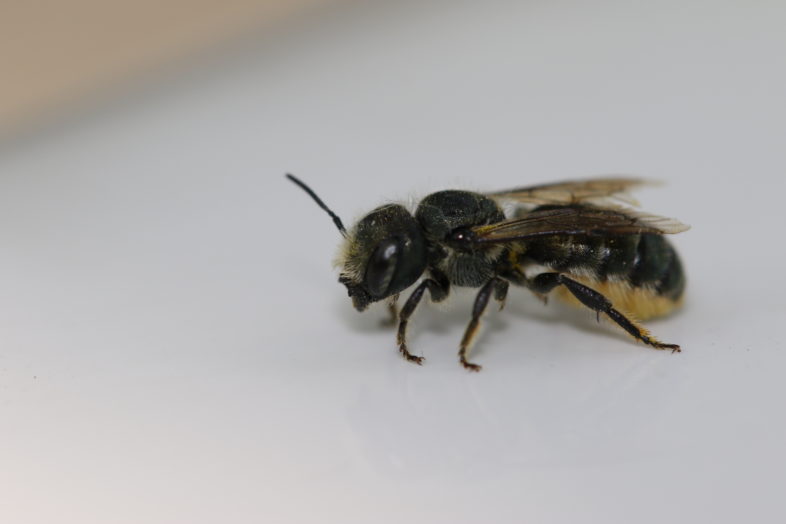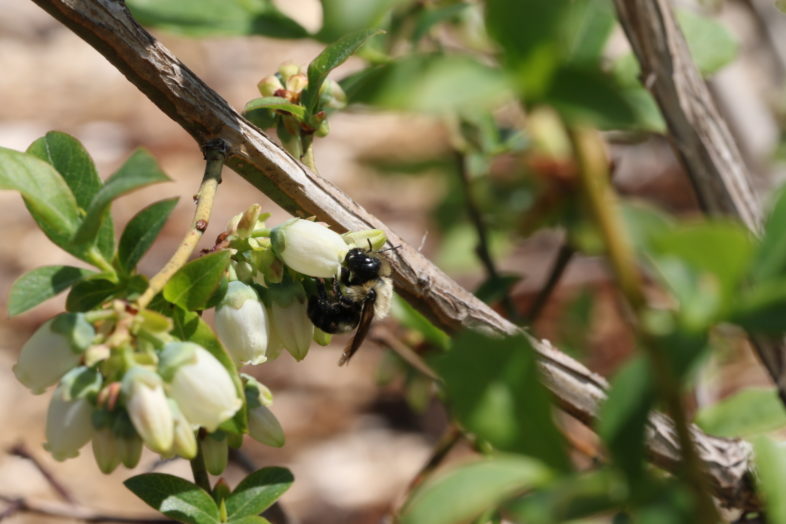Bees are charismatic pollinators that are loved by many. Given the alarming news of wild bee population declines in recent years, it’s no wonder that helping bees is a high priority for many avid gardeners. Adding bees to your landscape may seem like an easy way to help boost local populations; however, adding plants instead of bees is much more likely to be beneficial. Concern about struggling bee populations has spawned an industry of mail-order wild1 bee suppliers that often target landowners. Despite good intentions, importing live bees into Vermont poses a significant threat to native species and is not recommended without carefully considering the risks and benefits.
The most common commercially available solitary bees are cavity-nesting species in the family Megachilidae. Mason bees (Osmia), and to a lesser extent Leaf-cutter Bees (Megachile), are shipped as cocoons during winter for release in the spring. While some suppliers provide information on the species (or even subspecies) for sale, others offer “Mason Bees” or “Leafcutter Bees” without naming the specific species. (Vermont has 17 species of Mason Bees and 18 species of Leafcutters.) Some of the most readily available species—Alfalfa Leafcutter (Megachile rotundata) and Horn-faced Mason (Osmia cornifrons)—are not native to the United States, though they are already widely distributed. A recent study found that native Mason Bees (Osmia) declined following the arrival of Horn-faced Mason (Osmia cornifrons) and another closely related introduced species. With an increasing number of non-native species in the US, the potential for inadvertently spreading novel invasive bees is a serious concern for the long-term stability of native bee communities.
Furthermore, bees, including masons and leafcutters, are susceptible to a wide range of pathogens and parasites, including fungi, viruses, mites, wasps, and even other bees. The concern is that commercially available cocoons and occupied nests could introduce these threats to a new area. Although some suppliers offer cleaned pupae, which are less likely to harbor pathogens, others sell bees in the previous summer’s nesting tubes, which could easily contain problematic species.
Individuals can also purchase social Bumble Bee species online; however, these species are primarily sold to commercial growers for crop pollination. The Bumble Bee industry is older and a bit more regulated, but similar concerns about pathogen spread remain. If using Bumble Bee colonies, adding queen excluders can reduce negative impacts.
Even if a supplier is selling clean, native bees, it is unclear how beneficial this practice is, as survival and multiplication of the bees are going to depend on the resources (flowers and nesting sites) available. Instead of purchasing bees, consider improving available habitat, which should attract wild bees better adapted to your local environment. For recommendations on pollinator-friendly plants, see our Backyard Bee Habitat information sheet.
1. Honey Bees (Apis melifera) are a much larger industry that is a broader topic and better covered elsewhere.
—END—
Photographs

Georgia Mason Bee © Spencer Hardy.

Bufflehead Mason Bee (right) © Spencer Hardy.
